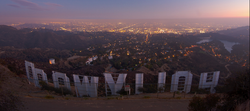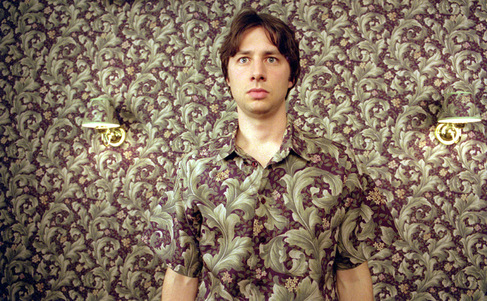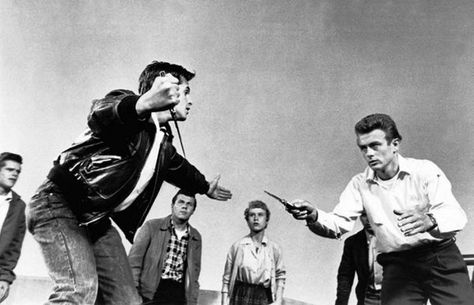
You won't be happy anywhere.
I used to think this was completely untrue. I believed, in a way, that people could will themselves to be happy--but mostly what I meant was that I thought I could will myself to be happy. In high school I envisioned myself as a teenager stuck in suburbia, suffocated by the atmosphere of simple teenage minds and their simple teenage opinions and, most of all, their simple lack of culture. Living my entire life 20 minutes and a train ride away from San Francisco left me with the idea that there was something just out of my reach; an access to culture that was just barely out of my grasp. I was on the other side of society's counter-culture: I had the ability to peek in but not able to break through. I blamed this on my suburban locale: stifling, limited, and simple. To me, this was the greatest sin of them all. In my mind, I was determined to be a starving artist, sacrificing security and wealth for a desire to stay steadfast in my creativity. But so far I've felt that my entire life has been a search for the creative aspect that should be driving my life.
As an only child, I spent most of my time alone. Part of this loneliness was comforted by the static image of the screen, more specifically, the television screen. On the weekends that I was able to spend with my father--the earlier years of my childhood--much of our time was spent going to the movie theaters. Since my father was not what one would call strict or restrictive, I was privy to movies that most would call inappropriate for a pre-adolescent. This translated to a somewhat early exposure of movies that, perhaps, should have been introduced later in life. When I hit teenage-hood I yearned for more from my onscreen experiences. I required more from the movies and television shows that raised me: like my growing self, I required my movies and TV shows to grow with me, and to teach me.
I used to think this was completely untrue. I believed, in a way, that people could will themselves to be happy--but mostly what I meant was that I thought I could will myself to be happy. In high school I envisioned myself as a teenager stuck in suburbia, suffocated by the atmosphere of simple teenage minds and their simple teenage opinions and, most of all, their simple lack of culture. Living my entire life 20 minutes and a train ride away from San Francisco left me with the idea that there was something just out of my reach; an access to culture that was just barely out of my grasp. I was on the other side of society's counter-culture: I had the ability to peek in but not able to break through. I blamed this on my suburban locale: stifling, limited, and simple. To me, this was the greatest sin of them all. In my mind, I was determined to be a starving artist, sacrificing security and wealth for a desire to stay steadfast in my creativity. But so far I've felt that my entire life has been a search for the creative aspect that should be driving my life.
As an only child, I spent most of my time alone. Part of this loneliness was comforted by the static image of the screen, more specifically, the television screen. On the weekends that I was able to spend with my father--the earlier years of my childhood--much of our time was spent going to the movie theaters. Since my father was not what one would call strict or restrictive, I was privy to movies that most would call inappropriate for a pre-adolescent. This translated to a somewhat early exposure of movies that, perhaps, should have been introduced later in life. When I hit teenage-hood I yearned for more from my onscreen experiences. I required more from the movies and television shows that raised me: like my growing self, I required my movies and TV shows to grow with me, and to teach me.
When Netflix first hit the scene I was about 14 years old. I had just watched Zach Braff's Garden State and believed myself to have hit the highest echelon of filmmaking (but mostly my teenaged self was just impressed by the music video-like quality of the movie), so I, naturally, begged my mother to sign us up. This was during their 1-DVD-at-a-time plan when Instant Watch was non-existant. Netflix became my saving grace in high school: my one true friend, my rock. On the days I came home from school to receive a new movie in the mail, I would set aside a portion of my afternoon to lounge on the couch and enjoy--truly enjoy--the, admittedly, overrated movies which I thought to be my whole world. In those days, I took Netflix's Recommended section as the final word. There I welcomed myself to movies like Donnie Darko, Amelie, American Beauty, Pulp Fiction; movies that, although weren't cinematic masterpieces, were films that I probably wouldn't have gotten to had I never contracted myself to Netflix's services. These movies became the archive that I would draw on and allow to become my driving force. They became the movies that made me love films and filmmaking, and want to pursue it as a career.
When I began thinking about my future and where to apply for college, I narrowed my focus on two choices: Music Therapy (with an emphasis as a concert pianist), or, my **dream job**, Film Criticism. I had gone to the University of the Pacific for an audition and walked away with a hefty scholarship--the professor, I'm assuming, having been somewhat satisfied with my performance. I wasn't sure if I would accept or not. Later that month, as the deadline for college applications reared its ugly head, I recalled a novel that I had stumbled upon at the library, a novel titled "Escape from Film School". In the book, the protagonist is a male who finds himself a student at the University of Southern California's film school. I never finished the book--it wasn't a very good read--but it did make me aware of the possibility of film school. Still, I had never taken a film, photography, or film criticism class in my life and so the prospect seemed far out of my reach. But as November rolled by, I realized that it wouldn't hurt to at least take a look at the requirements necessary to apply to USC's film school. When I saw that the application requirements were a few writing pieces, some which I had in my archive and some which I would still need to write, I knew that I had to take that leap. I opened a new document and began writing.
When I began thinking about my future and where to apply for college, I narrowed my focus on two choices: Music Therapy (with an emphasis as a concert pianist), or, my **dream job**, Film Criticism. I had gone to the University of the Pacific for an audition and walked away with a hefty scholarship--the professor, I'm assuming, having been somewhat satisfied with my performance. I wasn't sure if I would accept or not. Later that month, as the deadline for college applications reared its ugly head, I recalled a novel that I had stumbled upon at the library, a novel titled "Escape from Film School". In the book, the protagonist is a male who finds himself a student at the University of Southern California's film school. I never finished the book--it wasn't a very good read--but it did make me aware of the possibility of film school. Still, I had never taken a film, photography, or film criticism class in my life and so the prospect seemed far out of my reach. But as November rolled by, I realized that it wouldn't hurt to at least take a look at the requirements necessary to apply to USC's film school. When I saw that the application requirements were a few writing pieces, some which I had in my archive and some which I would still need to write, I knew that I had to take that leap. I opened a new document and began writing.
I remember it was something about James Dean. And then another piece about Travis Bickle. I had compared him to Holden Caulfield--I know, not a very creative or original idea, a pretty teenage one at that, but there's a reason why they make you read Catcher in the Rye in high school. I've always wondered which admissions officer accepted me and why. My application didn't scream film expert and my classes didn't appear to show an interest in film (though, it was largely because my small farm-town high school didn't offer any). I'll always believe that the admissions officer that day took pity on me. My writing showed a passion for movie-watching, but talent? I still don't know if I have an eye for anything, really. My GPA wasn't exceptional, either. The two other students from my graduating class who ended up going to USC were phenomenally smart. Like, Calculus II and Introductory Physics type smart. The last math course I took in high school was Statistics. The last science class? Biotechnology. Joke courses that a student with no interest or patience for STEM subjects will take in an effort to appease parents, colleges, and high school graduation requirements. I think of myself as a hard-worker, but deserving of a film school as highly-regarded as USC? I still wonder about that sometimes.
When I applied to film school I didn't think I'd end up there. I really didn't think I'd end up living within a mile from where James Dean, the subject I wrote about in my application essay, shot the stabbing scene in Rebel Without a Cause. It's terrible to think that I'm ungrateful for my fortune, especially in a school that both grants kids their dreams and tramples on them just as easily, but it's hard to say if I'm happy here. I'm truly lucky to have experienced what's been offered at the school, but what I've come across has also diminished my ideals of the school's credibility. There are countless individuals I find almost undeserving of their spot in the school. This seems almost hypocritical of myself to say, since my own seat in the school was given to me when I exhibited little to no experience in film writing. However, the vapidity of many students, as long as their seeming lack of insight and involvement has given me a newfound lack of hope in my peers, and as a result, my school. Last September I took a trip to New York to celebrate my 21st birthday. Visiting New York had been a lifelong dream of mine (living there is still on my list). To say it was not a disappointment is an understatement. I felt almost at home there, even though I was ~3000 miles away from the state I lived my entire life in. It's an incredible cliche to say that I felt like a belong in New York--anyone will feel like they belong in New York, but for me, I never wanted to leave. To this day, I wonder if maybe I should have followed through on my acceptance to NYU, rather than pursue a film degree at USC. While I hadn't been guaranteed a spot in the film program at NYU, it was an opportunity that would have allowed me a chance to live 4 years in a place I had always dreamed of. It would have been incredibly hard work, foreign, and likely full of heartbreak and humbling experiences, but I'll never know. The same could be said for the opposite, however, and I wonder if it would have been true. I still pride myself when the annual lists of top film schools in the nation are revealed and find USC at the top. Still, there's just something about sitting in the subway, riding across the Brooklyn Bridge that just feels natural and freeing. It's at least a step up from the stifling nature of bumper-to-bumper traffic on the 405. That alone takes me back to when I was 14 and stuck in suburbia, looking out of a tiny window, imagining the limitlessness of my future.




 RSS Feed
RSS Feed